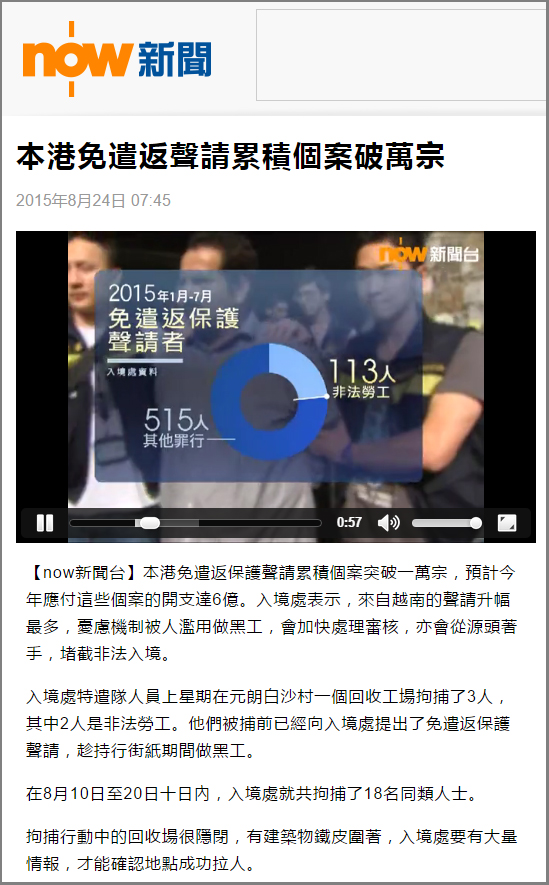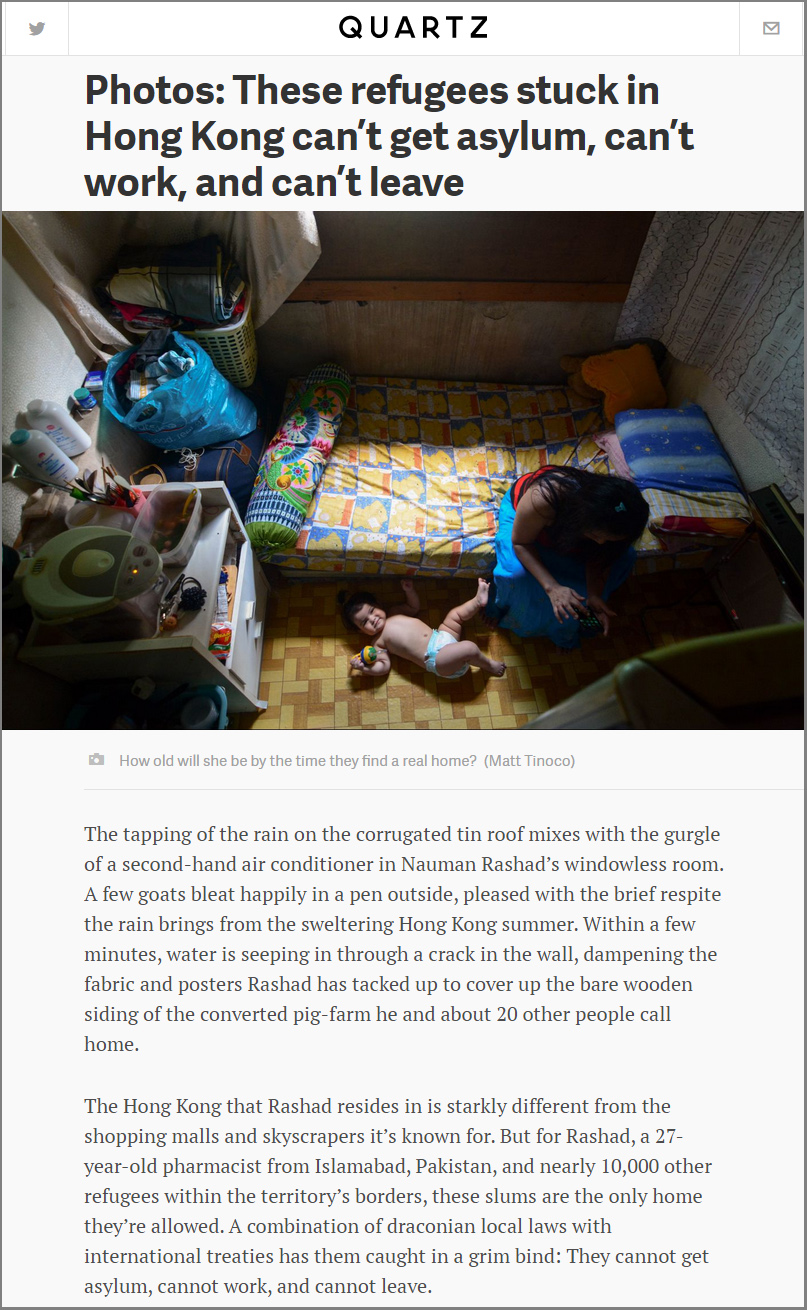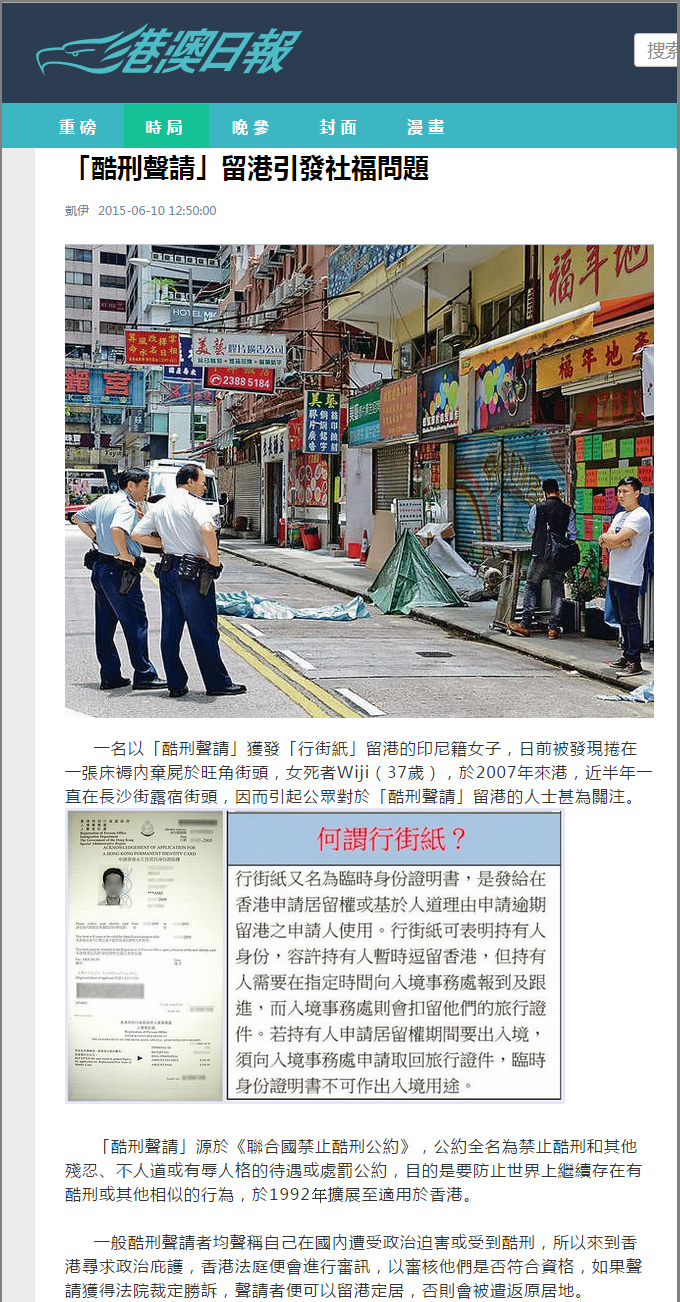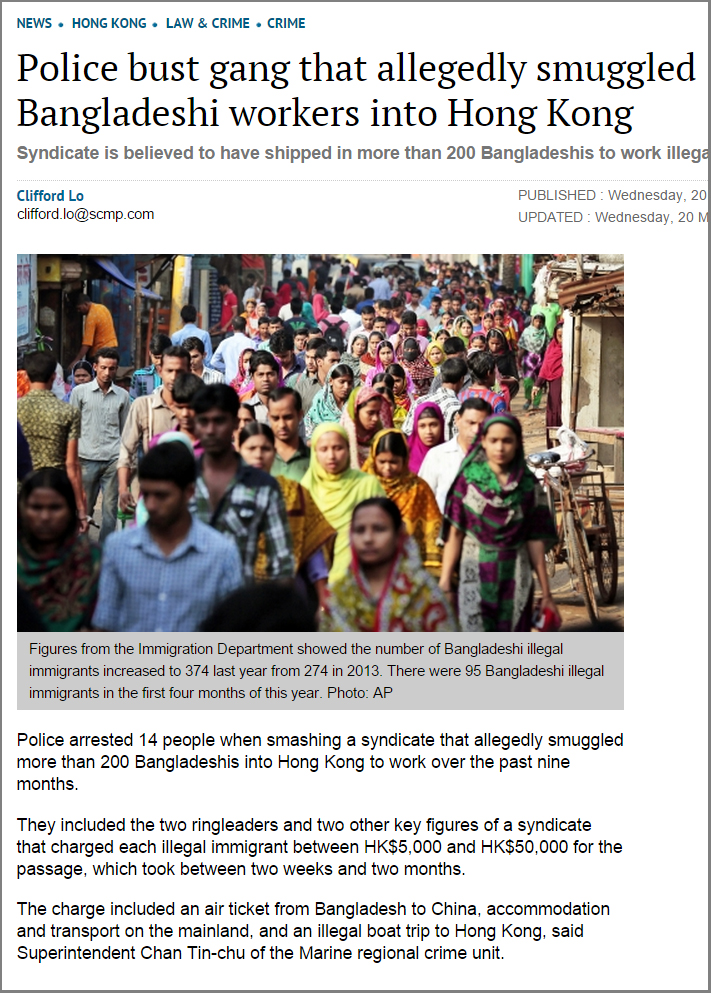Refugees stuck in Hong Kong can’t get asylum, can’t work, and can’t leave
Aug 17th, 2015 | Crime, Food, Housing, Immigration, Media, Rejection, Welfare | Comment
Refugee alleges forced deportation without proper screening
Jul 24th, 2015 | Crime, Detention, Immigration, Rejection | Comment
On 23 July 2015, Vision First was contacted by a member who alleges that Immigration deported him to Nepal with questionable tactics, prior to the commencement or completion of USM screening.
The conversation below, edited for clarity, raises a host of troubling questions:
- Why was the refugee jailed for illegal entry after 2 years on bail?
- Why does the refugee complain that Immigration officers “forced me” to sign documents?
- Why was the refugee threatened with imprisonment if he didn’t sign?
- Why didn’t Immigration translate and provide copies of such documents?
- Why wasn’t the USM screening completed, if commenced at all?
- If a USM Notice of Decision was issued, why wasn’t a copy given to the refugee?
- Why didn’t an interpreter translate the Notice to the refugee?
- Why was the refugee denied the right to appeal?
- How did the assigned duty lawyer defend the refugee?
- Did the duty lawyer ensure a high standard of fairness?
Click here to download a PDF of the conversation
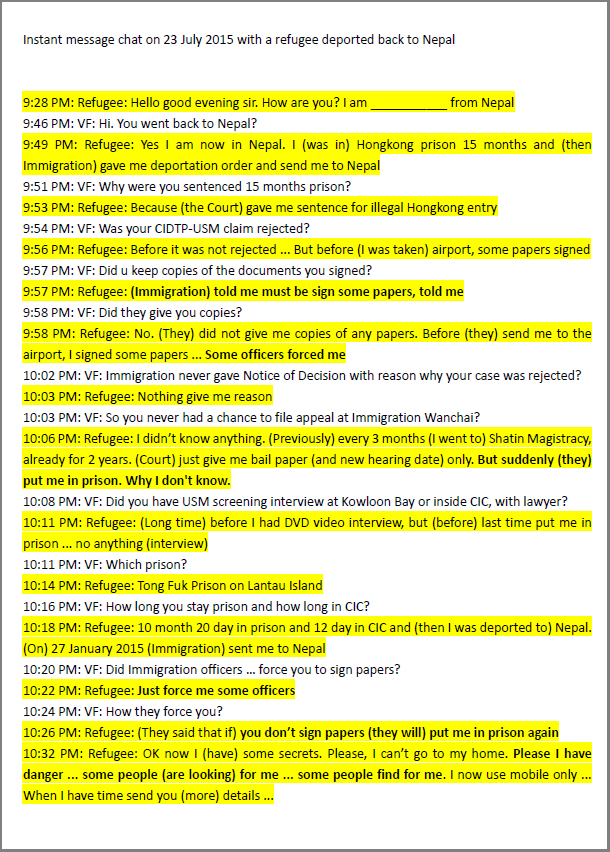
Inside prison I work for the government
Jul 22nd, 2015 | Crime, Housing, Immigration, Personal Experiences, Welfare | Comment
I am scarred because I don’t want to go back to prison. I was sentenced to 15 months for working to support my family, but I didn’t do anything criminal. In my mind, it was political persecution because refugees don’t have a straight road to walk. We go the wrong way because we don’t get enough assistance. We work to pay rent and buy food, but the police arrest us for “unlawful employment”.
I am a South Asian refugee mother with two daughters. Honestly I tell you, it is impossible for us to live with 3000$ rent and food coupons. Refugees need cash for many things, like going to the market and buying Pampers, clothes and school supplies. That is why we must do part-time job for our families in the day to day struggle. Also, my mother back home is sick, but I have no money to help.
In 2012, I was arrested at a fish restaurant in Tuen Mun. The police catch me and my offence is taking unlawful employment. Now I wish to unburden myself and tell the truth that the judge did not consider. The ISS assistance did not pay my full rent and utilities. I have no husband so I have to worry about my girls and everything I have to buy for them. That is why I have to do work before and now.
I tell my problems to my case officer but she cannot help. “This is the rules”, she always tells me so I know that I have to find a way by myself. If the landlord kick us outside, what will happen to my girls? My friend introduced me to a boss who paid me 400$ to wash dishes all day. There is other work for women, but it is not acceptable for me because it is very dangerous and I have children.
Why inside prison have so many refugees working? Many resident prisoners refuse to work, or have mental problems, or do drugs before. Refugees are strong and hard-working. Inside prison we work for the Government of Hong Kong, for example, washing and ironing uniforms and hospital sheets. They pay us 5$ a day and get cheap labour from thousands of men and women refugees who cannot work outside. Why does it happen like this?
Before I am outside and I work for my family. When police catch me they send me to prison. Then I am inside prison and I work for the government. But still I am working: outside it was illegal because I cannot help the government, but inside it is legal because I can help the government. Would it be fairer for Immigration to let refugees work outside to buy what we need and not do crime?
Inside prison I cannot refuse to work because the officers shout at me. I must do the jobs that they give me all the morning and afternoon, also on Sunday. So please tell me if this is fair to refugees? Outside I cannot do work, but must survive without enough assistance. Inside I must do work like a slave for the Government for 15 months without a holiday and without choice. Is this right?
I don’t want to go back to prison. The police tell me that if catch again, next time they will fine me 50,000$ and put three years in prison. Now I don’t know how I can buy something that my daughters need. Every day and night I am going mentally sick and depression. Refugees are always scared of going to prison, even if their children are born on Hong Kong land and never see their parents’ country.
Also refugees have dreams for their future. I want a safe and healthy life for my children. I want them to be happy and not suffer like this. But what can I offer them? We cannot go back to my country and Hong Kong does not let us stay. I dream of a better future when I can do something good for children, because today they suffer too much.
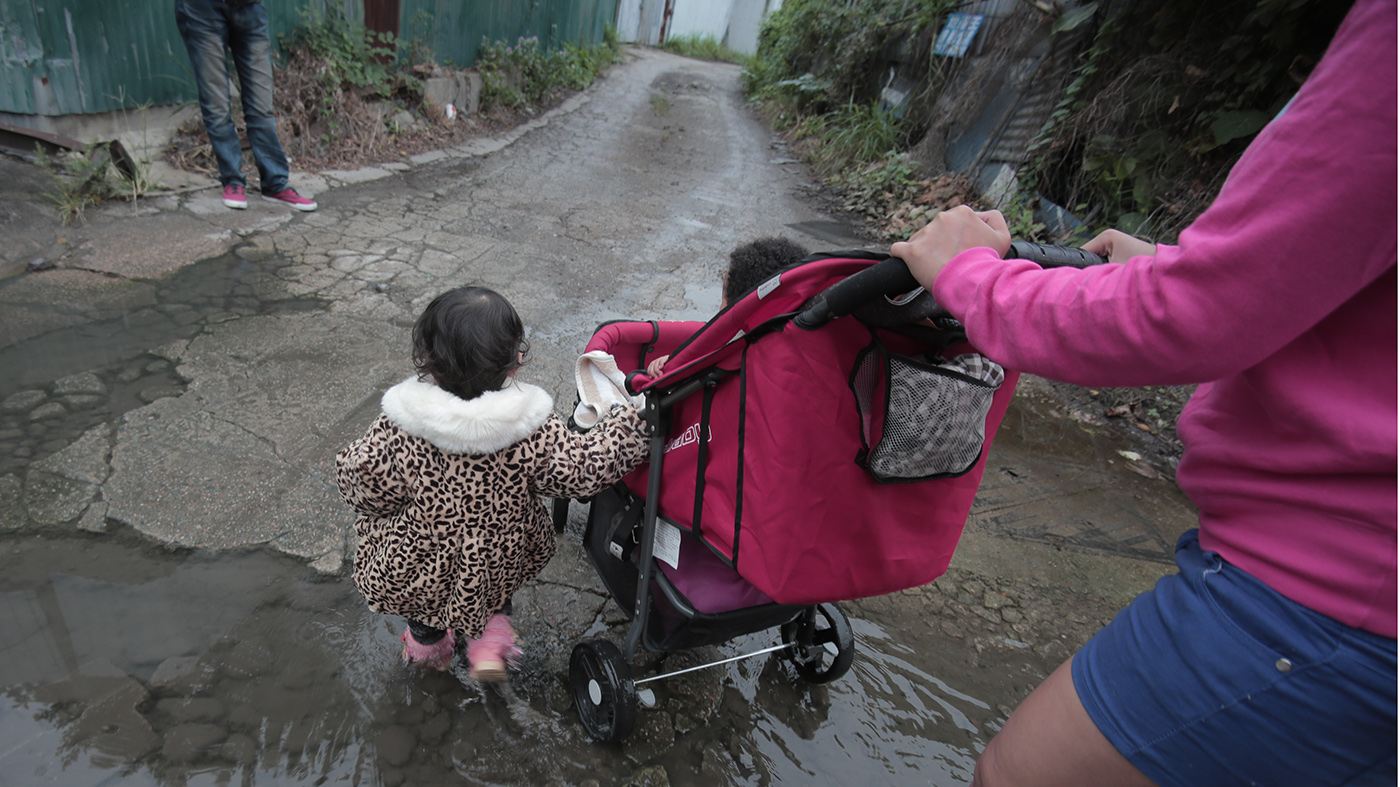
Eliminating violence in the securitization of refugee welfare
Jul 15th, 2015 | Advocacy, Crime, VF Opinion, Welfare | Comment
Vision First reported the case of a refugees in a wheelchair allegedly assaulted outside the premises of the service provider for refugees. While perhaps an isolated case, it nonetheless raises disturbing questions about the unfortunate securitization of refugee services.
First, “I came to Hong Kong as a victim of violence and here I suffer violence again,” sighed this distraught refugee as he reported being roughed up by security guards. A question may be raised as to the need for such a visible display of uniformed security guards in a setting where ‘humanitarian’ services are offered to people whose motivation for fleeing abroad relates to similar displays of an ostensible monopoly of violence. This refugee’s words brings to light the harsh confinement, subjugation and control of an underclass of 10,000 refugees, as well as what appears to be an inadequate understanding of refugee vulnerability.
Second, such an episode brings to light again questions about inadequate assistance. This refugee suffers medical conditions deemed worsened by his accommodation. And yet alternatives were not promptly offered. Behind the confrontations between case workers and refugees, behind the arguments over low assistance and high rent, and behind the swelling hatred stoked by the Hong Kong Government’s ‘humanitarian assistance’ lies the root of the problem.
Third, most evidently, if the refugee had indeed been given an appointment, why was he denied entry for hours? A structural dysfunctionality seems to exists on which Dr. Martin Luther King’s universal observation – interestingly written from inside a prison cell – may shed some light: “An unjust law is a code that a numerical or power majority group compels a minority group to obey, but does not make binding on itself. This is difference made legal.”
A refugee advocate interpreted such injustice, “I was told to find a room for 1500$, but my case officer knows it is impossible. If it were possible, why doesn’t he find it for me?” Arguably, the distribution of humanitarian assistance achieves the exact opposite of its stated objective. While it does little to prevent destitution, it dehumanizingly labels refugees as a burdensome, problematic and overly-demanding group that fails to appreciate the compassionate assistance and ostensible effort put in their care.
Faced by daily displays of emotional refugees, even security guards may lose the little empathy they had, addressing everyone with unsympathetic indifference, as tempers reach boiling point. An outspoken refugee who witnessed the wheelchair incident revealed that “The police had arrived. He was restrained and placed on the wheelchair. It was embarrassing to be a refugee. Anyone outside would see him and say ‘Refugees are crazy!’”
Fourth, it appears obvious that overly dehumanizing conditions can be either interiorized or resisted by refugees. A refugee advocate explained, “We should find a smarter way to solve our problems without giving people the opportunity to think that refugees are crazy. As refugees we should do something smart, something beautiful. Any injustice is an injustice, but it is also an opportunity for us to show it to the public.”
His words carried wisdom gained through years of imposed hardship, “We have to cure the disease, not cure the symptoms.” Focus ought to be drawn on the general context, rather than the outcome of individual behaviour, whether it is restrained and submissive, or not.
Vision First vigorously wages non-violence against social injustice, especially when sanctioned by state power in the unjust oppression of the most vulnerable in society, irrespective of immigration status.
An onerous corollary is our duty to expose and eliminate any form of violence in what, as a fifth point, can be said to emerge as the ongoing securitization of refugee welfare, manifested in the slums, food distribution, detention, criminal prosecutions, and manhandling of refugees.
Lastly, would Social Welfare Department staff shoved and pushed protesting refugees? Would the SWD condone such unwarranted conduct by its own security guards?
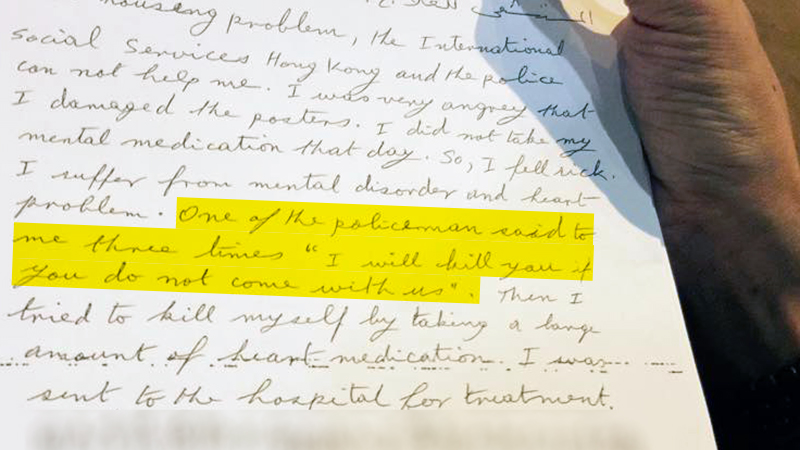
Hong Kong is a paradise for bad people and hell for good people
Jun 12th, 2015 | Crime, Immigration, Personal Experiences, Rejection | Comment
Vision First publishes letters and documents that our members wish to circulate to the wider public. In the best public interest, the following letter offers significant insights into the health of the current asylum mechanism and correlated issues. Hong Kong is a city of economic riches where business and profit are the prime engine upon which the government relies to retain the city’s international competitiveness. Are asylum policies integral elements supporting and/or removing impediments to economic growth?
Hong Kong is a paradise for bad people and hell for good people
I was a high profile political leader in a South Asian country. After 9/11 the USA and Western states decided to punish the militants involved with the terrorist attack on the World Trade Centre in New York. Our political party decided to stand with the so-called civilized world in the war against terrorism to defeat militancy. By doing so, party workers and leaders suffered great retaliation from several militant groups. As a result, over 1000 party members and relatives were killed by militants in kidnappings, suicide bombings and target killings. Further, some 10,000 party members and supporters fled abroad to save their lives from extreme brutality.
As per party policy, I also condemned the terror tactics of the militant groups in the local media and public meetings. By doing so, the militants turned their guns on me and my family, preventing me from attending my business and moving freely in my country. I received dozens of death threats by phone. I was beaten. My son was kidnapped and attempts were made to kidnap me too. The militants shot at me, my car and my home. Consequently, I lost my prosperous business and it became impossible for me to remain in my country.
Previously I had visited a number of European countries for business, but unfortunately when I decide to flee, I only had a Hong Kong visa, so I decided to take refuge here from the brutality of the militants. That was six years ago when I naively had the expectation that the Hong Kong Government and citizens would appreciate my sacrifice in the War Against Terror and help me stand back on my feet again.
But sorry to say that my expectations were ruined. After spending six years in Hong Kong, I am still in the same place where I started my journey. I have been maligned, humiliated, disrespected and forced to live like a beggar without future prospects. I provided all the necessary information and documents to the Immigration Department and requested them to please help me, but due to the Culture of Rejection my claim remains pending.
I also provided the same evidence to the UNHCR for my asylum claim, but they rejected it. It was only after five years suffering in Hong Kong that they turned around on their appeal rejection and unexpectedly granted me refugee status. Now I do not know how long I will further stay here before being re-settlement to a third country. One thing is notorious about Hong Kong: there is no appreciation or respect for the asylum seekers and refugees living here!
I have noticed that people come from all over the world and can live in Hong Kong for many years after obtaining a Recognizance certificate from the Immigration Department. I believe that getting such a document is very easy. After obtaining it, people can contact the ISS office to eat and live freely for many years.
As a politician and educated person I have noticed that the screening systems of Hong Kong Immigration is not fair, or just a joke. They do not make a difference between a HORSE and a DONKY and treat both the same way. This is the main reason that very large majority of torture claimants are fake and just come here to improve their financial conditions. I met many asylum seekers and torture claimants who are in Hong Kong for many years, they obtain fake ID and work with local businesses making good money.
I am sure this is the main reason for economic migrants to come to Hong Kong, when they know that they can stay free of cost for ten years and earn 15 to 20 thousand HKD per month. So surely one can say that “Hong Kong is a paradise for bad people and hell for good people”.
Through the publication of this letter I request to genuine asylum seekers not to come to Hong Kong to receive justice because there is no justice here. Yes, if you want to work and make money, then Hong Kong is the best place in the world, where you will obtain fake ID and make a fortune working for years.
Sincerely,
Mr. Khan Zeb
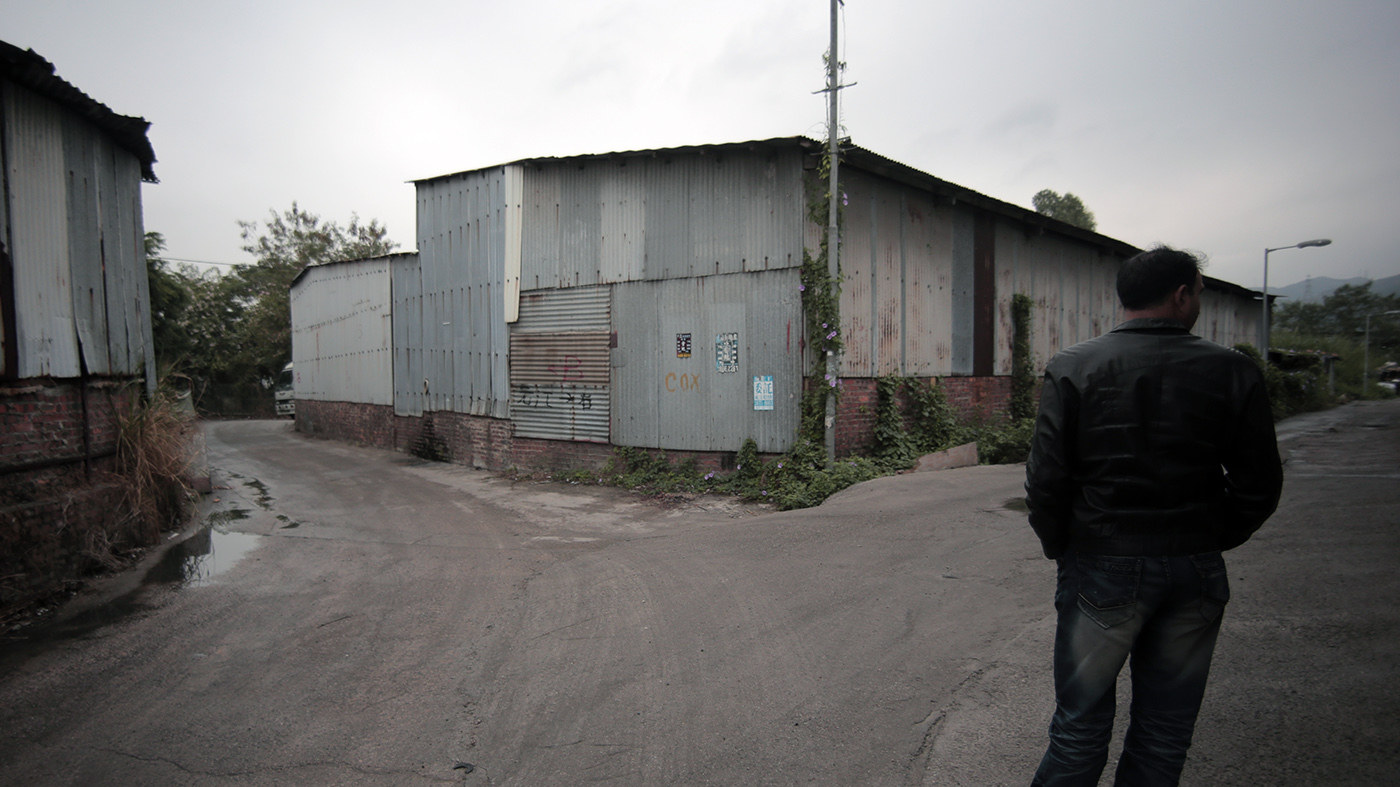
Homeless asylum seeker found dead in Hong Kong streets
Jun 11th, 2015 | Crime, Housing, VF Opinion, Welfare | Comment
An Indonesian refugee was found dead wrapped in a discarded mattress on the streets of Mongkok on 9 June 2015, reported the South China Morning Post on 8 June 2015. This tragedy highlights a general lack of protection for refugees in Hong Kong.
Homelessness is increasingly a problem faced by many asylum seekers who are not only denied sufficient welfare assistance, but are also increasingly made to wait long periods before they can access such assistance. The case of a refugee minor who was homeless for two months was reported by Vision First last week.
In April a fire broke out on a foot bridge in Sham Shui Po where many street-sleepers lived. It is reported that several dozen homeless refugees live in cardboard boxes in the area, exposed to the elements as well as to risks of fire, disease and crime. There is a troubling correlation between severe destitution and criminality – both as perpetrators and victims.
The government claims that refugees, officially branded ‘illegal immigrants’, are a problem for the security of society and therefore must be removed as soon as possible. A question should be raised: are refugees the only ones allegedly posing a threat to society? Isn’t the government endangering the life of people whose prolonged stay in Hong Kong is the responsibility of flawed border controls and a judicially bashed asylum mechanisms?
A Coroner’s Examination ought to be launched into the most recent death to ascertain why and to what effect a refugee woman, who is said to have lodged a claim in 2007, and therefore was in Hong Kong for over eight years, was apparently homeless in Mongkok.
A troubling reality might be presented before our eyes. Does the current assistance fail to offer in-kind assistance “to prevent them [refugees] from becoming destitute”?
Vision First is concerned about the generalizations made by Deputy Director of Social Welfare, Mr. Lam Ka-tai, at a Legco Panel on Welfare Services meeting, following the Hon. Elizabeth Quat’ question, “Are there any (refugee) street-sleepers?”
The Hon. Quat persisted, “Do you know if any of them are street-sleepers? Do you know?” Mr. Lam’s ensuing response came as a surprise, “As far as I know there aren’t any!”
Mr. Lam Ka-tai may perhaps want to examine the 76 article on our website relating to homeless refugees, and discover a reality he might have been concealed from him. This link is provide for his convenience: https://www.vfnow.org/?s=homeless
UPDATE:
http://www.ejinsight.com/20150609-pakistani-wanted-in-the-death-of-indonesian-woman/
http://www.thestandard.com.hk/news_detail.asp?pp_cat=11&art_id=157883&sid=44641693&con_type=1&d_str=20150611&isSearch=1&sear_year=2015
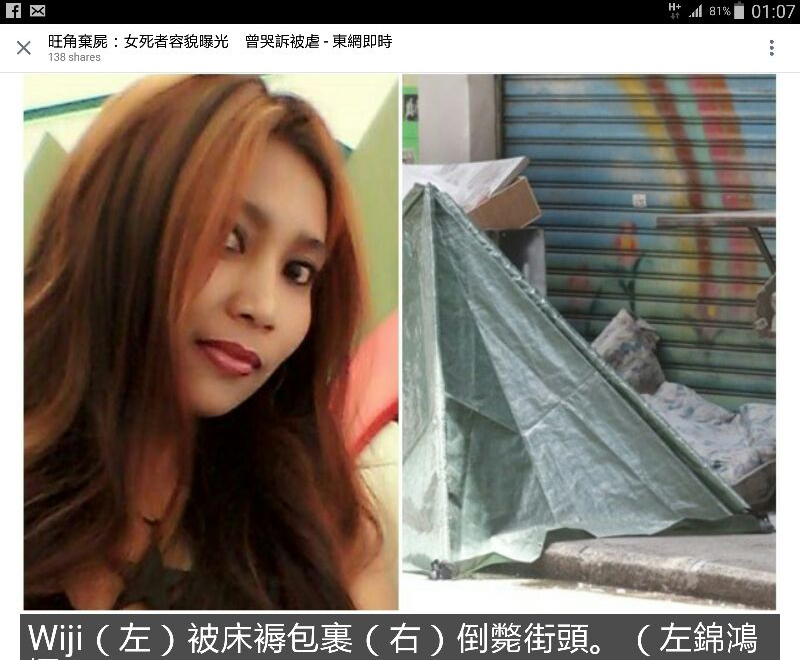
Liberty secured for detained refugee after harrowing treatment in CIC
Jun 4th, 2015 | Crime, Detention, Immigration, Legal, Rejection | Comment
Freedom and justice were almost denied Mr. Q, a South Asian refugee who sought the protection of Hong Kong Government on 23 December 2014, only to be detained and subjected to robust rejection and removal action until his release from Castle Peak Bay Immigration Centre (CIC) on 3 June 2015.
What suffering does a persecuted refugee endure in 162 days and nights of Immigration detention? For good reasons unlawful detention is compensated by Hong Kong law with HK$1,000 per day, as the rule of law takes the depravation of anyone’s liberty most seriously. Facts lead us to believe that this might not always be the case behind the secretive walls of Immigration detention.
The legal team of Barrister Robert Tibbo and solicitor Chris Lucas finally secured Mr. Q’s release after filing a leave application for Judicial Review at the High Court. Upon the application being filed, the Director of Immigration, K.K. Chan made the decision not to deport the refugee and a few days later exercised his discretion to release him from CIC. The process however was less than smooth.
The Director of Immigration had previously attempted to deport Mr. Q from Hong Kong, the last attempt being made on 1 June 2015. On that day, the legal team acted with great determination and urgency to file the leave application for Judicial Review in the High Court before the 4pm deadline, thus stopping the Director from deporting their client.
It should be noted that on 1 June 2015, the Director of Immigration, K.K. Chan was fully aware that the legal team had already applied for Legal Aid, was about to file a Judicial Review and had applied for and successfully obtained an Anonymity Order from a High Court judge. Despite all of the above, the Director took every possible step to attempt to deport the refugee prior to the 4pm deadline.
Mr. Q’s account of his treatment by Immigration officers inside CIC and at the airport is disturbing.
The refugee reports, “Immigration officers pressured me to leave. Some day after I met [Barrister Robert Tibbo and solicitor Chris Lucas] they took me to the airport. An officer threatened, ‘If you refuse to go back we will tie you to a chair, put a helmet on your head and drag you to the airplane.’ They pushed me around. They shouted, ‘Don’t give us trouble! Don’t make any noise, or something will happen to you. If you make trouble we can do anything to you!’”
Mr. Q was shaken by one experience in particular, “One day around 3:45pm, Immigration officers brought me down from 7th floor to the ground floor at CIC. They took me inside a female changing room. They threatened and scared me. They yelled, ‘Don’t make any trouble! Just go back to your country quietly. Just do what we tell you to do! Don’t ask any questions! Don’t argue with us!’”
He recalls, “There were four officers and they all shouted very loudly at me. They shouted, ‘If necessary we will use all our power to send you back!’ Even when my pants were slipping down from my waist, they didn’t care. They didn’t even let me pull them up. They kept pushing me from behind, telling me to walk faster. They brought me to the female changing room because there are no video cameras there.”
Vision First has no reason to believe that Mr. Q is lying, although readers may judge for themselves. Lastly, alert readers might wonder how such harrowing treatment by Immigration officers meets the high standard of fairness demanded by Hong Kong law in the processing and determination of asylum claims.
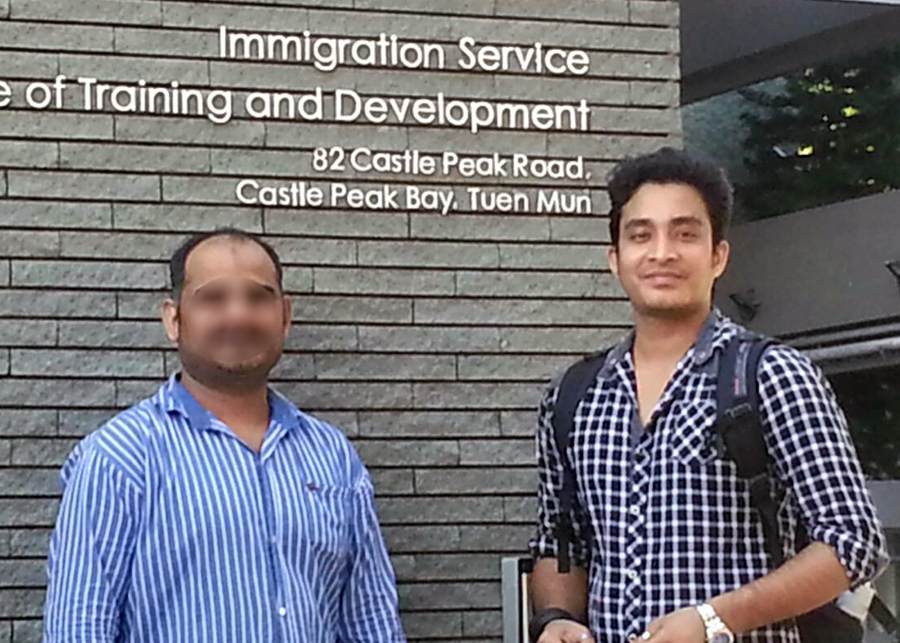
Police bust gang that smuggled Bangladeshi workers into Hong Kong
May 20th, 2015 | Crime, Immigration, Media | Comment


